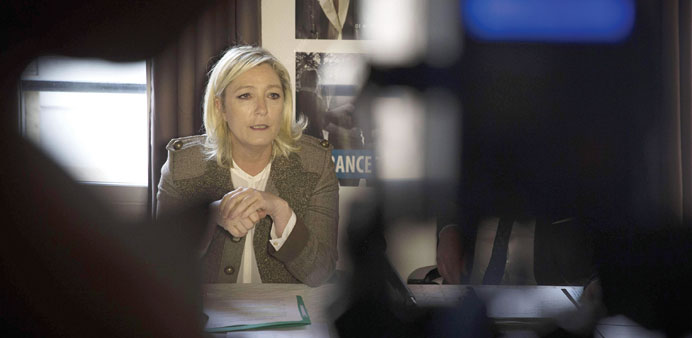By Jessica Camille Aguirre/Paris/ DPA
Virtually no local councillors in France were members of the far-right National Front party as of last week.
Despite gaining more votes than any other party in France during elections in May for the European Parliament by taking 25% of the ballots, the National Front has struggled to gain a political foothold domestically.
It performed well during the first round of municipal elections in March but floundered during second-round voting and only secured 12 mayoralties.
After the party garnered nearly 26% support during first-round voting in departmental elections on Sunday, the question of its future role in France is again under scrutiny: is the National Front slowly building its reputability as a party that can hold office or does it serve mostly as a fracturing force to the political mainstream?
“If we win a department, ... we would have the opportunity to demonstrate that we are able to prove ourselves as we have done with the municipalities,” party leader Marine Le Pen told France Info radio last week. She said the party would decrease taxes and fight “fiscal madness”.
The point was a clear jab at the ruling Socialist party, which has been plagued by miserable approval ratings as President Francois Hollande walks a thin line between reducing budget deficits to meet European standards while protecting the interests of the labour groups who have supported him.
Negligible economic growth rates and persistent unemployment have also contributed to Hollande’s sinking support in opinion polls despite a brief spike in response to his handling of a series of terrorist attacks in Paris in early January.
Le Pen, an ambitious and charismatic politician who has shaped the National Front into a legitimate political force, has used those attacks to further the party’s anti-immigration agenda.
“We must gain control of our borders; we need to stop immigration and immediately suspend Schengen in order to monitor who is leaving and entering,” Le Pen told France 24 last week, referring to the Schengen treaty, which removed border controls for 26 European countries.
“We must attack the development of Islamic fundamentalism in our country, and I want to say, we must suspend the construction of any new mosque pending verification of their funding sources,” she said.
Although Le Pen’s rhetoric refrains from the polemical outbursts that made her father, National Front founder Jean Marie Le Pen, famous, her statements like that - along with the possible splintering of power - have made mainstream politicians shy away from the party.
Leaders in the two main parties, the Socialists and the conservative Union for a Popular Majority (UMP), have been torn about how to handle runoff votes this coming Sunday against National Front candidates.
Former president Nicolas Sarkozy, who has lead the UMP since August, called on his voters in departments where no UMP candidate made the second round to abstain from voting.
After his party was the top vote-getter in the first round with 29%, Sarkozy said the result “shows the French people’s desire for clear change”.
“To those who voted for the National Front,” he said, “I say that we hear their exasperation, but this party, which has the same economic policy as the extreme left, does not represent an alternative.”
Prime Minister Manuel Valls, a Socialist who has urged voters to cast their votes for any party except the National Front, objected to Sarkozy’s UMP-or-nothing message, calling it a moral blunder.
Whatever tactic the main parties take - whether uniting in opposition to the National Front or withholding support entirely - the surging presence of Le Pen and her followers has upended much of the established political strategy.

Marine Le Pen: says her party will decrease taxes and fight u201cfiscal madnessu201d.
